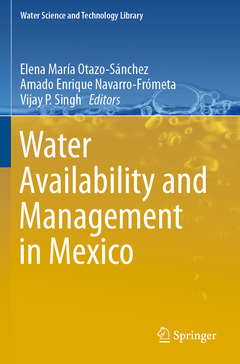Water Availability and Management in Mexico, 1st ed. 2020 Water Science and Technology Library Series, Vol. 88
Coordonnateurs : Otazo-Sánchez Elena María, Navarro-Frómeta Amado Enrique, Singh Vijay P.

This book presents several complex case studies related to water management and planning in the context of pollution, growing demands, and global climate change in Mexico, but which are also relevant for other countries in Latin America. These concerns are of critical importance for policymakers who are coping with multiple conflicting interests.
Water availability in Mexico is polarized, with abundant rainfall and large rivers in the south, and desert-like conditions in the north. The central region, which is the most industrialized, is overpopulated. Mexico City pours millions of cubic meters of ?blackwater? into the northern valley daily and receives its clean water from the south. To address these unsustainable conditions, the world's 4th biggest water treatment plant went into operation in 2018.
The water infrastructure and governance must satisfy the demands of all sectors, including agricultural, urban, and economic activities. At the same time, water resources are affected by drought, and climate change puts constraints on the supply. As such, regulation and monitoring are important when it comes to adherence to agreed plans and priorities.The book is divided into four sections. 1: Water Availability discusses quantitative aspects, such as supply, methods of calculation, and fracking. 2: Water Quality highlights pollution risks and diagnosis of water resources. 3: Water Allocation examines the sectoral demands and vulnerability due to unsustainable irrigation. 4: Water Governance and Management focuses on laws, urban rules, national parks, planning, and integrated water resources management, among other topics.
The chapters include illustrative case studies in Mexico, such as basins, cities, reservoirs, and aquifers, water supply demand assessment, planning, and management.
Elena M. Otazo-Sanchez is a Full Professor in the Chemistry Department at Hidalgo State Autonomous University awarded as National Researcher Grade II by The Mexican National Council for Science and Technology (CONACYT). She received her B.S., M.S., and Ph.D. degrees in Chemistry at Havana University, where she was a full professor. Granted with a Patrimonial Cathedra by CONACYT and 21 national and international projects, invited professor at Havana University, Barcelona Autonomous University, Moskow State University, and Technischen Hochschule „Carl Schorlemmer“ Leuna-Merseburg. Member of the Mexican Environmental Sciences Association, leader and founder of the National Academic Network for Environmental Sciences and Sustainable Development, and member of the Network for Water Quality and Availability. She has led the interdisciplinary research project of the Hidalgo State Program for Climate Change Actions. Professor Otazo has graduated tents of BSc, MSc and Ph.D. pupils, published the results in hundreds of journals, conference papers, books and book chapters in water quality, heavy metal sensor ionophores, materials for water treatment, basins, groundwater, water resources, GHG emissions, and mitigation scenarios. For his scientific contributions, she has received national and international honors.
Amado Enrique Navarro Frómeta is a Full Time Professor in the Food Technology Department at the Technological University of Izúcar de Matamoros, México and recognized National Researcher Grade I by The Mexican National Council for Science and Technology (CONACYT). He received his B.S., degree in Chemistry at Havana University and his PhD degree in the Institute of Petroleum and Chemistry of Azerbaidzhan (at the present time the Petroleum Academy). He is member of the American and Cuban Chemical Societies, leader of the CONACYT Network for Water Quality and Availability. He has led various scientific Projects and has graduated 30 BSc students and
Presents a fusion of social and technical approaches to analyzing current water problems
Includes data and unpublished Mexican case studies, with similarities to other regions in Latin America
Highlights inspiring lessons learned through the great diversity and variety of socio-environmental conditions
Presents a comprehensive overview, including history, political administration, groundwater, and basins
Discusses sustainable water management related to appropriate governance
Date de parution : 10-2020
Ouvrage de 516 p.
15.5x23.5 cm
Disponible chez l'éditeur (délai d'approvisionnement : 15 jours).
Prix indicatif 105,49 €
Ajouter au panierDate de parution : 10-2019
Ouvrage de 516 p.
15.5x23.5 cm
Disponible chez l'éditeur (délai d'approvisionnement : 15 jours).
Prix indicatif 105,49 €
Ajouter au panierThèmes de Water Availability and Management in Mexico :
Mots-clés :
Aquifer and basin management; Water availability scenarios and balance modelling; Water mitigation in high demand sectors; Water Governance in Mexico; Effect of climate change on water availability; Water Availability in Mexico; Water Quality in Mexico; Water Allocation in Mexico; Water management; Water in Latin American cities; Wastewater treatment plant; Water regulation in Mexico; water quality and water pollution; hydrogeology



